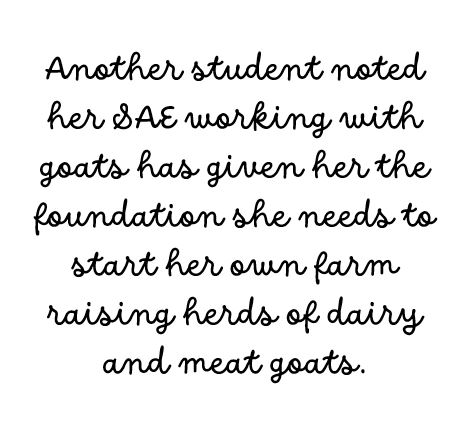The “Three-Component Model of Agricultural Education” is vital for a well-rounded agricultural education that builds upon itself through skills, experience, and leadership:
- Classroom/laboratory: contextual, inquiry-based instruction and learning through an interactive classroom and laboratory
- FFA: premier leadership, personal growth, and career success through engagement in FFA
- Supervised agricultural experience (SAE): experiential service or work-based learning through the implementation of an SAE program
Yet the component least known outside of agricultural education is the SAE component. To emphasize the value of SAEs, the SAE for All initiative was started to ensure every student had access to career-ready skills gained from the experience. Through the SAE for All program all students start with a foundational SAE and can then expand into one or more immersion SAEs.
 Foundational SAE
Foundational SAE
A foundational SAE involves five required components:
- career exploration and planning
- employability skills for college and career readiness
- personal financial management and planning
- workplace safety
- agricultural literacy
These five components are key to ensuring student success beyond high school. By eliminating barriers and requiring SAEs of all students in agricultural education, students that walk into the classroom are better prepared for the day they eventually leave the classroom. While all students are required to have a foundational SAE, not all SAEs can be counted as a “work-based learning experience” for state data.
Immersion SAE
Immersion SAEs build upon the knowledge students gain from their foundational SAE by gaining real-world experiences within their chosen field of interest. There are five types of immersion SAEs that students may choose:
placement/internship
- ownership/entrepreneurship
- research: experimental, analysis, or invention
- school-based enterprise
- service learning
In most cases, only immersion SAEs would be considered a work-based learning experience for the purpose of state reporting. To count as a state-reported work-based learning experience, SAEs need to meet six characteristics:
- Involves sustained direct interactions with industry or community professionals for at least 90 hours.
- Takes place in a real agricultural workplace.
- Provides first hand engagement with relevant agricultural tasks.
- Aligns with an agricultural course.
- Utilizes a training agreement between the student, employer, and agricultural educator.
- Involves supervision and evaluation through a partnership between the employer and agricultural educator.
Learn more about SAE for All. For questions related to agricultural education, please contact Sally Ladsten, DPI Agriculture, Food, and Natural Resources Education Consultant and FFA State Advisor.
